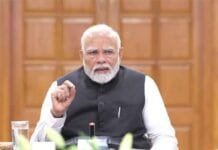Short Description : The coaching industry in India is booming despite government efforts to curb it. This article explores the astonishing 146% increase in GST collections from coaching centers over the last five years and examines the challenges and contradictions surrounding the New Education Policy.
Introduction
INVC NEWS
New Delhi : In the ever-evolving landscape of education in India, coaching centers have become a significant player. While the government aims to curtail the influence of these centers through policy measures, recent data reveals an unexpected reality. The coaching business has not only thrived but has also substantially increased its contribution to the government’s coffers through GST. This article delves into the paradox of the burgeoning coaching industry, scrutinizing its financial impact, regulatory challenges, and the broader implications for India’s education system.
The Coaching Boom: A Financial Snapshot
GST Collection Soars
The numbers paint a vivid picture of the coaching industry’s growth. According to the latest figures presented in Parliament, GST collections from coaching institutes have surged dramatically over the past five years:
- 2019-20: ₹2,240.73 crore
- 2020-21: ₹2,215.24 crore
- 2021-22: ₹3,045.12 crore
- 2022-23: ₹4,667.03 crore
- 2023-24: ₹5,517.45 crore
This represents an astonishing increase of 146% in just five years. Union Minister of State for Education, Dr. Sukanta Majumdar, highlighted this growth in his recent parliamentary address, emphasizing the thriving nature of the coaching business despite the government’s attempts to regulate it.
The GST Rate and Its Implications
The government imposes an 18% GST rate on coaching centers, a significant source of revenue. This sharp rise in collections indicates not just a growth in the number of coaching centers but also a steady increase in the fees they charge. Despite efforts to rein in this industry, the revenue from GST shows no signs of abating, underscoring the lucrative nature of the coaching business.
The New Education Policy: A Double-Edged Sword?
Aimed at Discouraging Coaching Culture
The New Education Policy (NEP) 2020 was introduced with the goal of reshaping India’s education system. One of its recommendations was to discourage the proliferation of coaching centers, which are often seen as a byproduct of the existing educational pressures. The policy aimed to reduce the reliance on these centers by promoting a more holistic and integrated approach to education.
The Unintended Consequence
However, the rise in GST collections suggests that the NEP’s recommendations have not yet translated into a decrease in the coaching industry’s influence. Instead, the contributions of coaching centers to the government’s exchequer have more than doubled since the policy’s introduction. This raises questions about the effectiveness of the NEP in curbing the coaching culture and highlights a growing disconnect between policy intentions and real-world outcomes.
Regulatory Shortcomings: An Ongoing Challenge
Delayed Regulatory Actions
Despite the NEP’s goals, the government’s efforts to regulate coaching centers have been sluggish. It took four years from the introduction of the policy for the Ministry of Education to issue directives on regulating these institutions. On January 16, 2024, the government finally instructed states and union territories to enforce regulations covering aspects such as coaching fees and operational timings.
The Accident in Delhi: A Wake-Up Call
The recent accident at a coaching institute in Delhi has further spotlighted the gaps in regulation and oversight. This tragic event has exposed several flaws in the current regulatory framework and highlighted the urgent need for comprehensive reforms. The incident has become a focal point in discussions about the safety and quality standards of coaching centers, adding pressure on the government to act decisively.
Educators’ Perspectives: A Call for More Stringent Measures
Growing Concerns Among Experts
Educationists and experts are increasingly vocal about the need for stricter regulations. Dr. Amit Kumar Niranjan, a prominent educationist, argues that the coaching industry has become more commercial than educational. He points out that coaching centers often hike their fees by 20-25% annually while failing to enhance their facilities or provide substantial value to students.
From Counseling to Commercialization
According to Dr. Niranjan, the primary role of coaching centers should be to provide career counseling and guidance. However, the current focus on profit has overshadowed their educational mandate. The commercial nature of these centers often leads to inflated promises and unrealistic expectations, further complicating the educational landscape for students and their families.
FAQs
Why has GST collection from coaching centers increased so significantly?
The increase in GST collection reflects the rapid expansion and commercialization of coaching centers. As these centers grow in number and raise their fees, the government’s revenue from GST also rises.
What are the key objectives of the New Education Policy regarding coaching centers?
The NEP aims to reduce the dependence on coaching centers by promoting a more integrated and holistic education system. It seeks to address the educational pressures that drive students to seek external coaching.
How has the government responded to the recent accident at a coaching institute?
The accident has highlighted the need for improved regulation and safety standards for coaching centers. The government has been prompted to expedite its regulatory measures in response to this tragic event.
What are experts saying about the future of the coaching industry?
Experts are calling for more stringent regulations to curb the commercialization of coaching centers and ensure they fulfill their educational roles rather than just focusing on profits.
Conclusion
The coaching business in India is a paradoxical phenomenon. While the government has made efforts to rein in this industry through policies like the NEP 2020, the significant increase in GST collections reveals a different story. The rapid growth of coaching centers, coupled with the lack of effective regulation and oversight, underscores the need for a more nuanced approach to education reform. As the coaching industry continues to fill government coffers with GST, it remains crucial for policymakers to address the underlying issues and ensure that education serves its intended purpose: fostering intellectual and personal development rather than becoming a commercial venture.
















